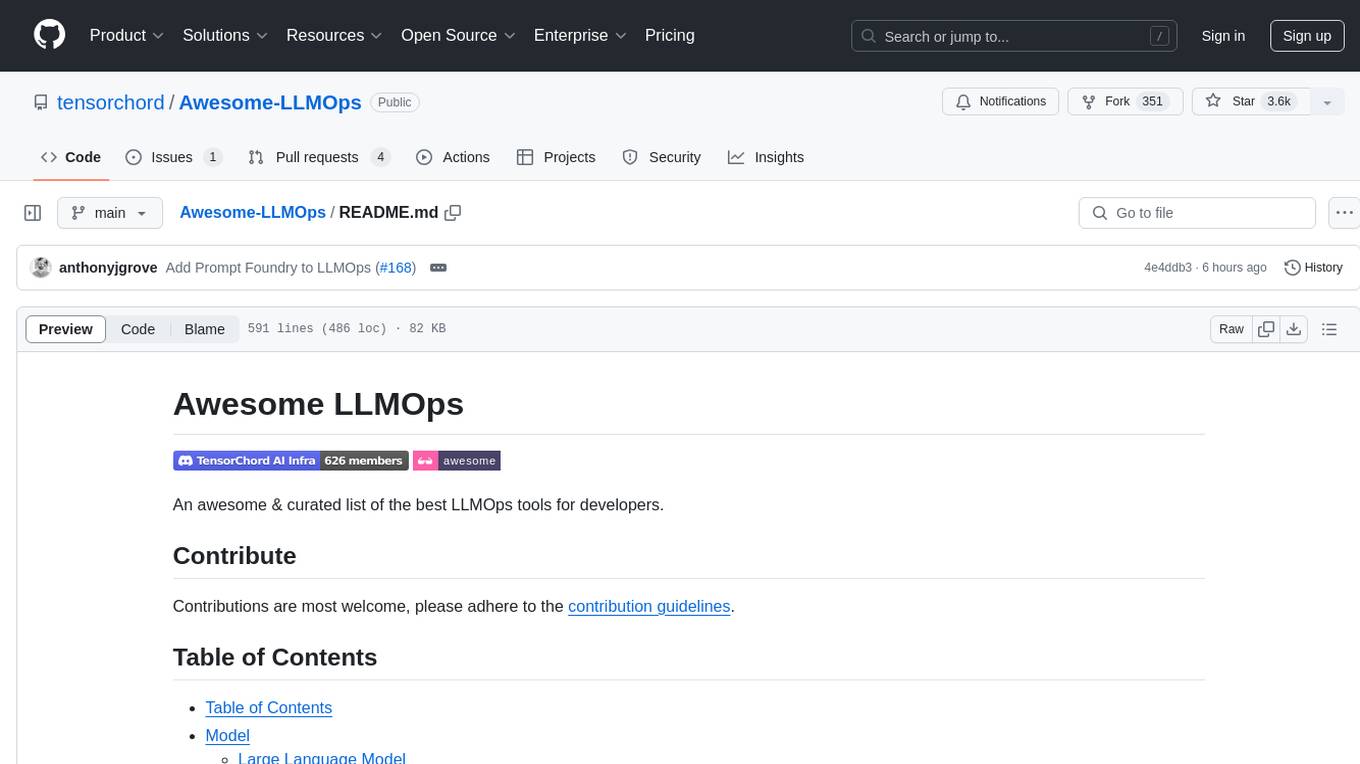
langfuse
🪢 Open source LLM engineering platform: LLM Observability, metrics, evals, prompt management, playground, datasets. Integrates with OpenTelemetry, Langchain, OpenAI SDK, LiteLLM, and more. 🍊YC W23
Stars: 22150
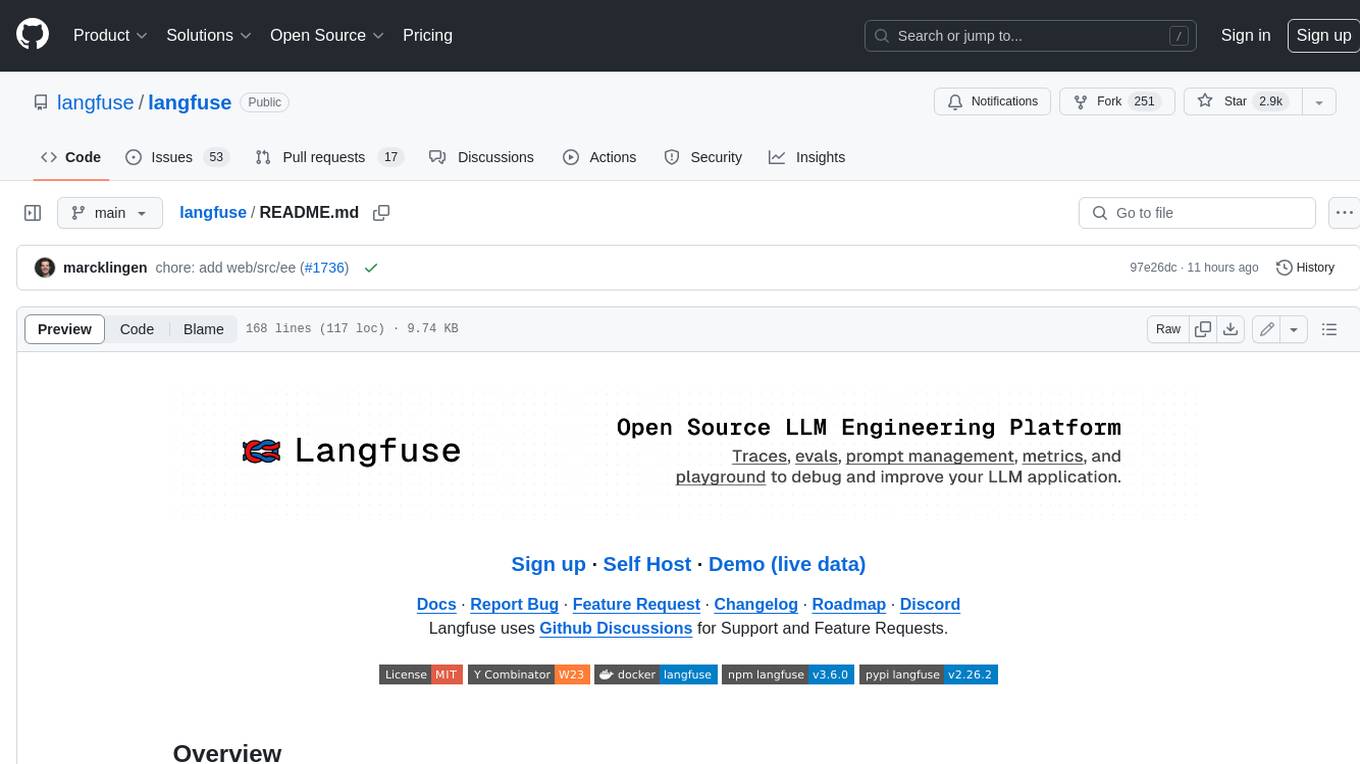
Langfuse is a powerful tool that helps you develop, monitor, and test your LLM applications. With Langfuse, you can: * **Develop:** Instrument your app and start ingesting traces to Langfuse, inspect and debug complex logs, and manage, version, and deploy prompts from within Langfuse. * **Monitor:** Track metrics (cost, latency, quality) and gain insights from dashboards & data exports, collect and calculate scores for your LLM completions, run model-based evaluations, collect user feedback, and manually score observations in Langfuse. * **Test:** Track and test app behaviour before deploying a new version, test expected in and output pairs and benchmark performance before deploying, and track versions and releases in your application. Langfuse is easy to get started with and offers a generous free tier. You can sign up for Langfuse Cloud or deploy Langfuse locally or on your own infrastructure. Langfuse also offers a variety of integrations to make it easy to connect to your LLM applications.
README:
Langfuse uses GitHub Discussions for Support and Feature Requests.
We're hiring. Join us in product engineering and technical go-to-market roles.
Proudly made with ClickHouse open source database
Langfuse is an open source LLM engineering platform. It helps teams collaboratively develop, monitor, evaluate, and debug AI applications. Langfuse can be self-hosted in minutes and is battle-tested.
-
LLM Application Observability: Instrument your app and start ingesting traces to Langfuse, thereby tracking LLM calls and other relevant logic in your app such as retrieval, embedding, or agent actions. Inspect and debug complex logs and user sessions. Try the interactive demo to see this in action.
-
Prompt Management helps you centrally manage, version control, and collaboratively iterate on your prompts. Thanks to strong caching on server and client side, you can iterate on prompts without adding latency to your application.
-
Evaluations are key to the LLM application development workflow, and Langfuse adapts to your needs. It supports LLM-as-a-judge, user feedback collection, manual labeling, and custom evaluation pipelines via APIs/SDKs.
-
Datasets enable test sets and benchmarks for evaluating your LLM application. They support continuous improvement, pre-deployment testing, structured experiments, flexible evaluation, and seamless integration with frameworks like LangChain and LlamaIndex.
-
LLM Playground is a tool for testing and iterating on your prompts and model configurations, shortening the feedback loop and accelerating development. When you see a bad result in tracing, you can directly jump to the playground to iterate on it.
-
Comprehensive API: Langfuse is frequently used to power bespoke LLMOps workflows while using the building blocks provided by Langfuse via the API. OpenAPI spec, Postman collection, and typed SDKs for Python, JS/TS are available.
Managed deployment by the Langfuse team, generous free-tier, no credit card required.
Run Langfuse on your own infrastructure:
-
Local (docker compose): Run Langfuse on your own machine in 5 minutes using Docker Compose.
# Get a copy of the latest Langfuse repository git clone https://github.com/langfuse/langfuse.git cd langfuse # Run the langfuse docker compose docker compose up
-
VM: Run Langfuse on a single Virtual Machine using Docker Compose.
-
Kubernetes (Helm): Run Langfuse on a Kubernetes cluster using Helm. This is the preferred production deployment.
See self-hosting documentation to learn more about architecture and configuration options.
| Integration | Supports | Description |
|---|---|---|
| SDK | Python, JS/TS | Manual instrumentation using the SDKs for full flexibility. |
| OpenAI | Python, JS/TS | Automated instrumentation using drop-in replacement of OpenAI SDK. |
| Langchain | Python, JS/TS | Automated instrumentation by passing callback handler to Langchain application. |
| LlamaIndex | Python | Automated instrumentation via LlamaIndex callback system. |
| Haystack | Python | Automated instrumentation via Haystack content tracing system. |
| LiteLLM | Python, JS/TS (proxy only) | Use any LLM as a drop in replacement for GPT. Use Azure, OpenAI, Cohere, Anthropic, Ollama, VLLM, Sagemaker, HuggingFace, Replicate (100+ LLMs). |
| Vercel AI SDK | JS/TS | TypeScript toolkit designed to help developers build AI-powered applications with React, Next.js, Vue, Svelte, Node.js. |
| Mastra | JS/TS | Open source framework for building AI agents and multi-agent systems. |
| API | Directly call the public API. OpenAPI spec available. |
| Name | Type | Description |
|---|---|---|
| Instructor | Library | Library to get structured LLM outputs (JSON, Pydantic) |
| DSPy | Library | Framework that systematically optimizes language model prompts and weights |
| Mirascope | Library | Python toolkit for building LLM applications. |
| Ollama | Model (local) | Easily run open source LLMs on your own machine. |
| Amazon Bedrock | Model | Run foundation and fine-tuned models on AWS. |
| AutoGen | Agent Framework | Open source LLM platform for building distributed agents. |
| Flowise | Chat/Agent UI | JS/TS no-code builder for customized LLM flows. |
| Langflow | Chat/Agent UI | Python-based UI for LangChain, designed with react-flow to provide an effortless way to experiment and prototype flows. |
| Dify | Chat/Agent UI | Open source LLM app development platform with no-code builder. |
| OpenWebUI | Chat/Agent UI | Self-hosted LLM Chat web ui supporting various LLM runners including self-hosted and local models. |
| Promptfoo | Tool | Open source LLM testing platform. |
| LobeChat | Chat/Agent UI | Open source chatbot platform. |
| Vapi | Platform | Open source voice AI platform. |
| Inferable | Agents | Open source LLM platform for building distributed agents. |
| Gradio | Chat/Agent UI | Open source Python library to build web interfaces like Chat UI. |
| Goose | Agents | Open source LLM platform for building distributed agents. |
| smolagents | Agents | Open source AI agents framework. |
| CrewAI | Agents | Multi agent framework for agent collaboration and tool use. |
Instrument your app and start ingesting traces to Langfuse, thereby tracking LLM calls and other relevant logic in your app such as retrieval, embedding, or agent actions. Inspect and debug complex logs and user sessions.
- Create Langfuse account or self-host
- Create a new project
- Create new API credentials in the project settings
The @observe() decorator makes it easy to trace any Python LLM application. In this quickstart we also use the Langfuse OpenAI integration to automatically capture all model parameters.
[!TIP] Not using OpenAI? Visit our documentation to learn how to log other models and frameworks.
pip install langfuse openaiLANGFUSE_SECRET_KEY="sk-lf-..."
LANGFUSE_PUBLIC_KEY="pk-lf-..."
LANGFUSE_BASE_URL="https://cloud.langfuse.com" # 🇪🇺 EU region
# LANGFUSE_BASE_URL="https://us.cloud.langfuse.com" # 🇺🇸 US regionfrom langfuse import observe
from langfuse.openai import openai # OpenAI integration
@observe()
def story():
return openai.chat.completions.create(
model="gpt-4o",
messages=[{"role": "user", "content": "What is Langfuse?"}],
).choices[0].message.content
@observe()
def main():
return story()
main()See your language model calls and other application logic in Langfuse.
Public example trace in Langfuse
[!TIP]
Learn more about tracing in Langfuse or play with the interactive demo.
Finding an answer to your question:
- Our documentation is the best place to start looking for answers. It is comprehensive, and we invest significant time into maintaining it. You can also suggest edits to the docs via GitHub.
- Langfuse FAQs where the most common questions are answered.
- Use "Ask AI" to get instant answers to your questions.
Support Channels:
- Ask any question in our public Q&A on GitHub Discussions. Please include as much detail as possible (e.g. code snippets, screenshots, background information) to help us understand your question.
- Request a feature on GitHub Discussions.
- Report a Bug on GitHub Issues.
- For time-sensitive queries, ping us via the in-app chat widget.
Your contributions are welcome!
- Vote on Ideas in GitHub Discussions.
- Raise and comment on Issues.
- Open a PR - see CONTRIBUTING.md for details on how to setup a development environment.
This repository is MIT licensed, except for the ee folders. See LICENSE and docs for more details.
We deploy this code base in Docker containers based on the Linux Alpine Image (source). You may find the Dockerfiles in web/Dockerfile and worker/Dockerfile.
Top open-source Python projects that use Langfuse, ranked by stars (Source):
We take data security and privacy seriously. Please refer to our Security and Privacy page for more information.
By default, Langfuse automatically reports basic usage statistics of self-hosted instances to a centralized server (PostHog).
This helps us to:
- Understand how Langfuse is used and improve the most relevant features.
- Track overall usage for internal and external (e.g. fundraising) reporting.
None of the data is shared with third parties and does not include any sensitive information. We want to be super transparent about this and you can find the exact data we collect here.
You can opt-out by setting TELEMETRY_ENABLED=false.
For Tasks:
Click tags to check more tools for each tasksFor Jobs:
Alternative AI tools for langfuse
Similar Open Source Tools

langfuse
Langfuse is a powerful tool that helps you develop, monitor, and test your LLM applications. With Langfuse, you can: * **Develop:** Instrument your app and start ingesting traces to Langfuse, inspect and debug complex logs, and manage, version, and deploy prompts from within Langfuse. * **Monitor:** Track metrics (cost, latency, quality) and gain insights from dashboards & data exports, collect and calculate scores for your LLM completions, run model-based evaluations, collect user feedback, and manually score observations in Langfuse. * **Test:** Track and test app behaviour before deploying a new version, test expected in and output pairs and benchmark performance before deploying, and track versions and releases in your application. Langfuse is easy to get started with and offers a generous free tier. You can sign up for Langfuse Cloud or deploy Langfuse locally or on your own infrastructure. Langfuse also offers a variety of integrations to make it easy to connect to your LLM applications.
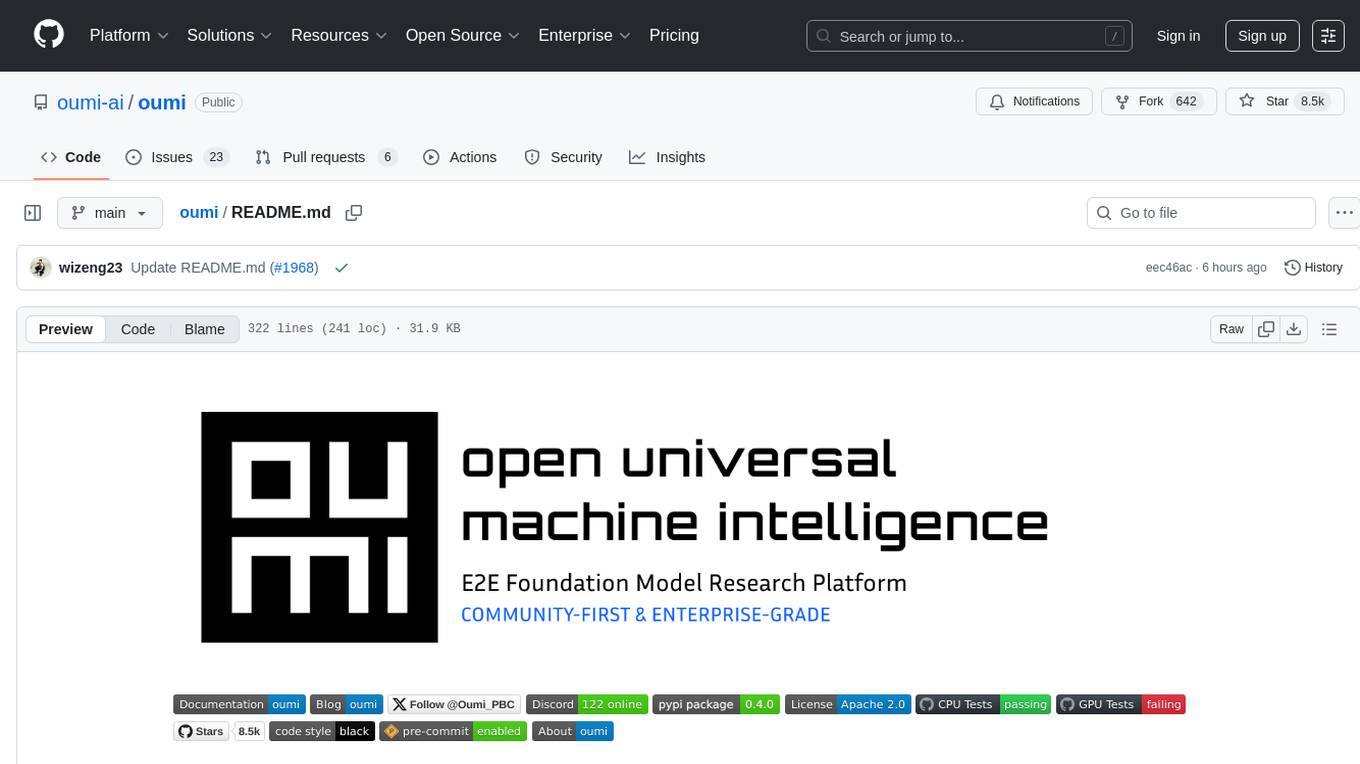
oumi
Oumi is an open-source platform for building state-of-the-art foundation models, offering tools for data preparation, training, evaluation, and deployment. It supports training and fine-tuning models with various parameters, working with text and multimodal models, synthesizing and curating training data, deploying models efficiently, evaluating models comprehensively, and running on different platforms. Oumi provides a consistent API, reliability, and flexibility for research purposes.
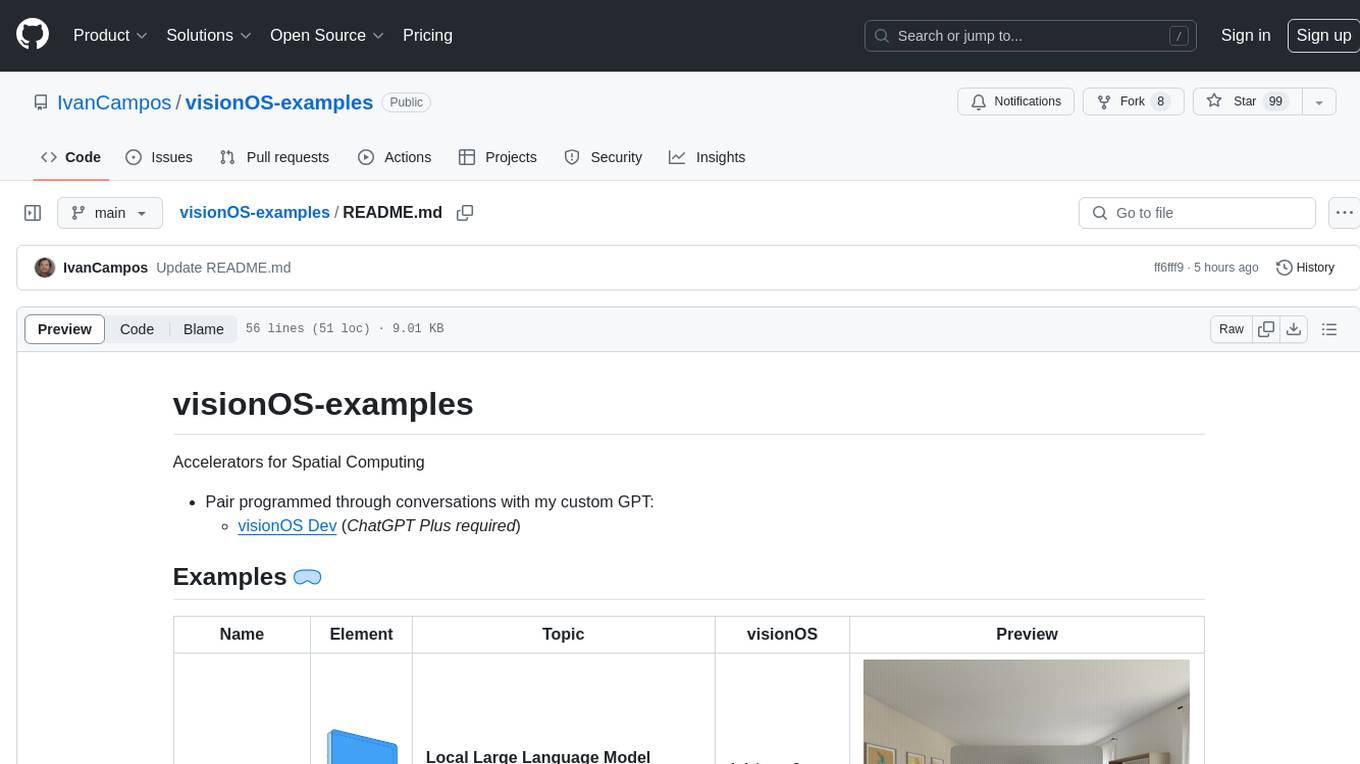
visionOS-examples
visionOS-examples is a repository containing accelerators for Spatial Computing. It includes examples such as Local Large Language Model, Chat Apple Vision Pro, WebSockets, Anchor To Head, Hand Tracking, Battery Life, Countdown, Plane Detection, Timer Vision, and PencilKit for visionOS. The repository showcases various functionalities and features for Apple Vision Pro, offering tools for developers to enhance their visionOS apps with capabilities like hand tracking, plane detection, and real-time cryptocurrency prices.
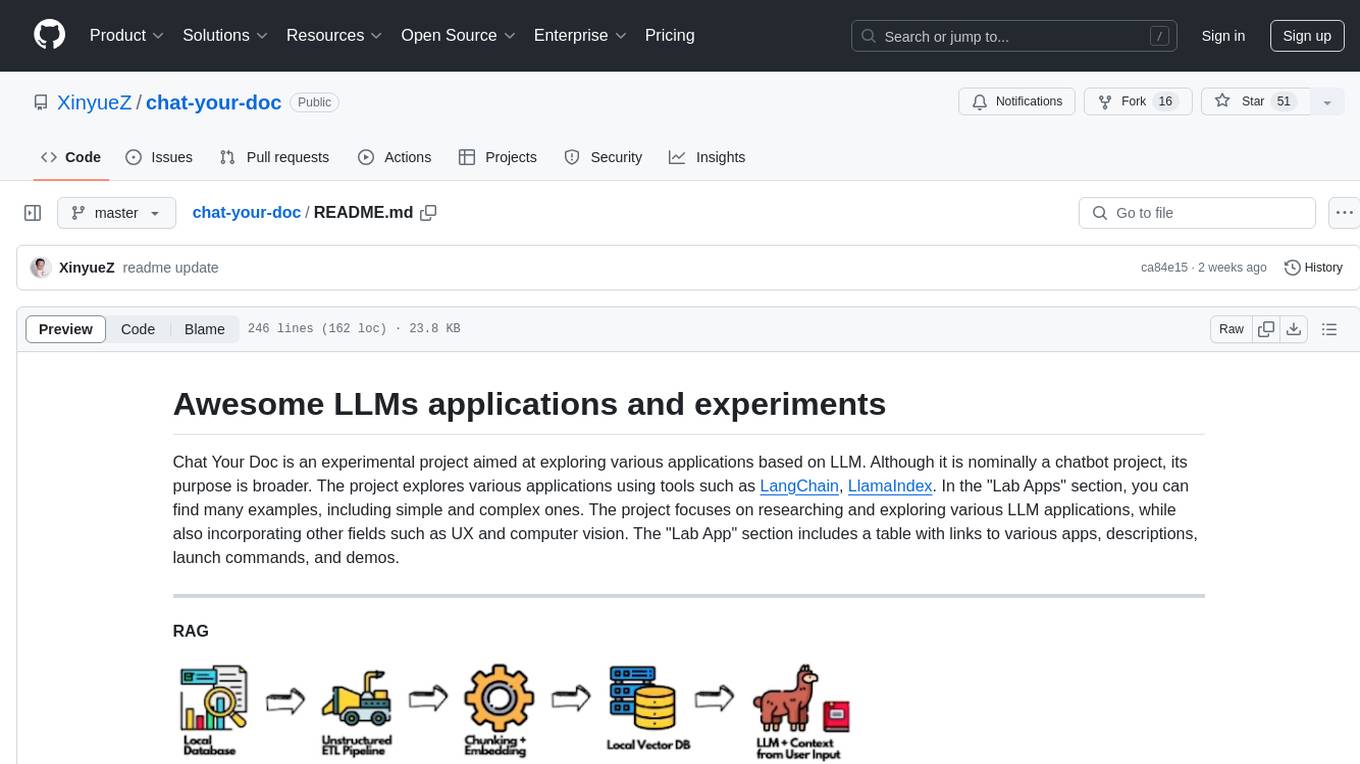
chat-your-doc
Chat Your Doc is an experimental project exploring various applications based on LLM technology. It goes beyond being just a chatbot project, focusing on researching LLM applications using tools like LangChain and LlamaIndex. The project delves into UX, computer vision, and offers a range of examples in the 'Lab Apps' section. It includes links to different apps, descriptions, launch commands, and demos, aiming to showcase the versatility and potential of LLM applications.
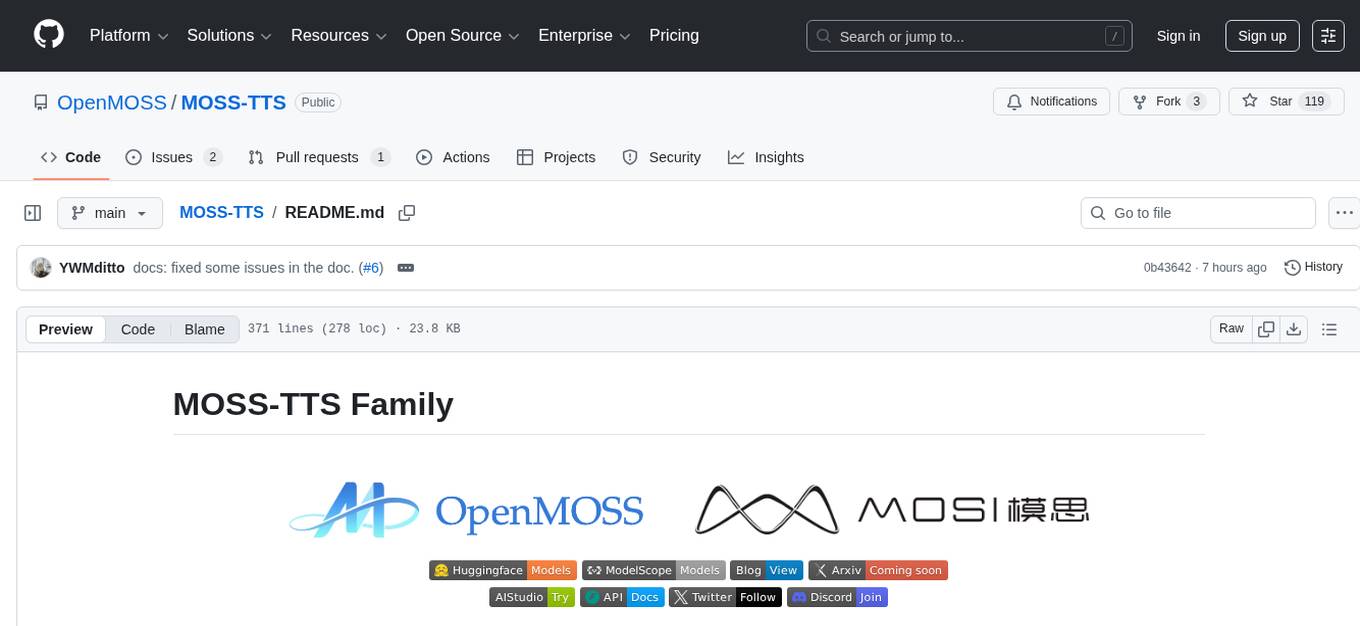
MOSS-TTS
MOSS-TTS Family is an open-source speech and sound generation model family designed for high-fidelity, high-expressiveness, and complex real-world scenarios. It includes five production-ready models: MOSS-TTS, MOSS-TTSD, MOSS-VoiceGenerator, MOSS-TTS-Realtime, and MOSS-SoundEffect, each serving specific purposes in speech generation, dialogue, voice design, real-time interactions, and sound effect generation. The models offer features like long-speech generation, fine-grained control over phonemes and duration, multilingual synthesis, voice cloning, and real-time voice agents.
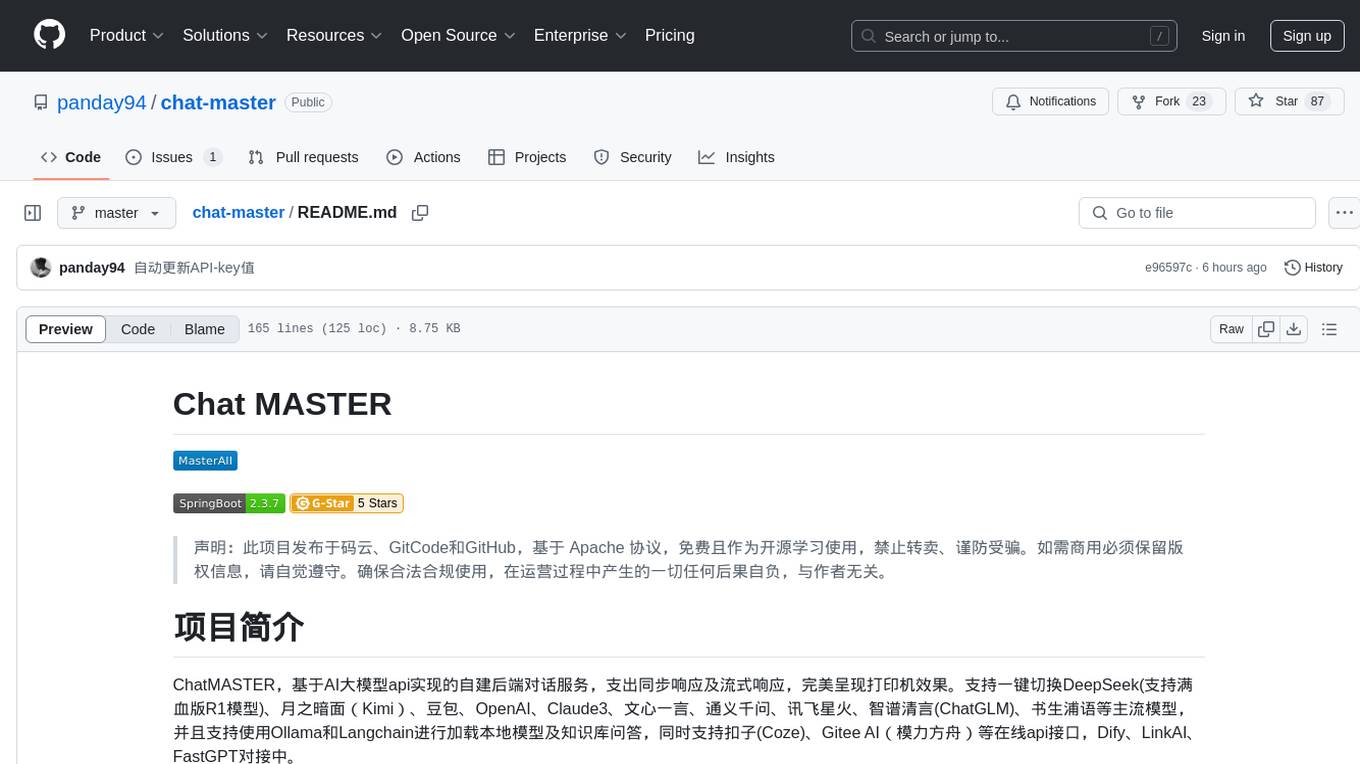
chat-master
ChatMASTER is a self-built backend conversation service based on AI large model APIs, supporting synchronous and streaming responses with perfect printer effects. It supports switching between mainstream models such as DeepSeek, Kimi, Doubao, OpenAI, Claude3, Yiyan, Tongyi, Xinghuo, ChatGLM, Shusheng, and more. It also supports loading local models and knowledge bases using Ollama and Langchain, as well as online API interfaces like Coze and Gitee AI. The project includes Java server-side, web-side, mobile-side, and management background configuration. It provides various assistant types for prompt output and allows creating custom assistant templates in the management background. The project uses technologies like Spring Boot, Spring Security + JWT, Mybatis-Plus, Lombok, Mysql & Redis, with easy-to-understand code and comprehensive permission control using JWT authentication system for multi-terminal support.
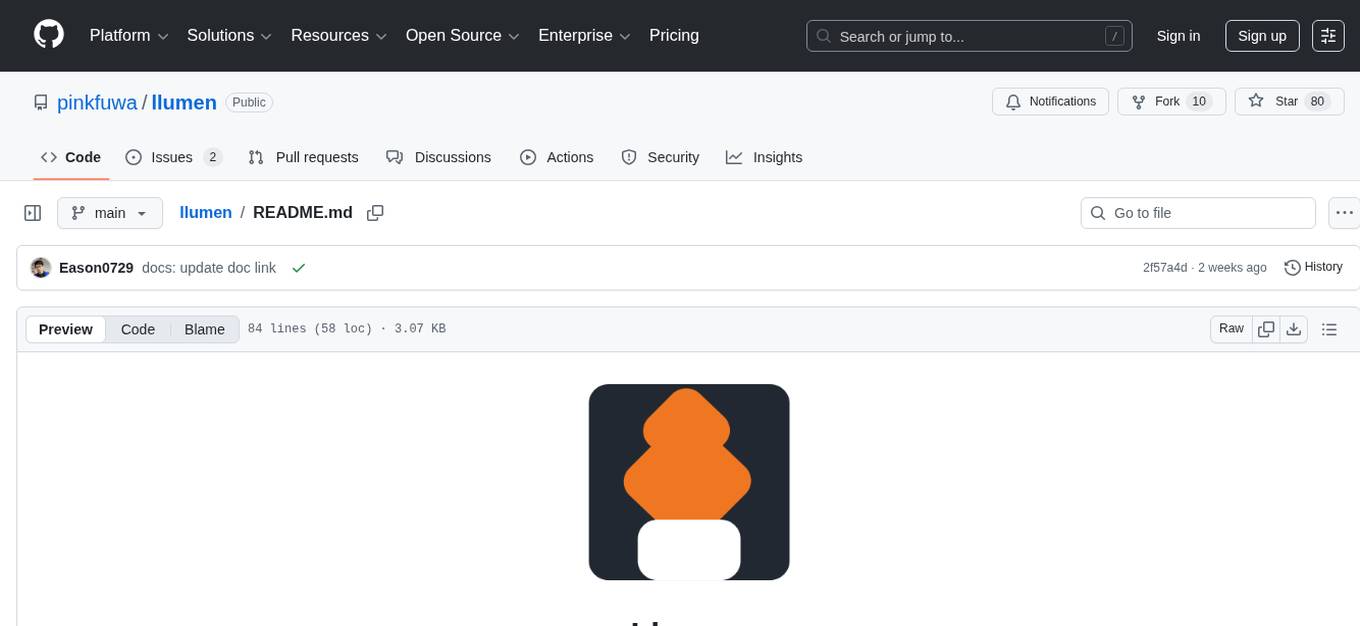
llumen
Llumen is a self-hosted interface optimized for modest hardware like Raspberry Pi, old laptops, and minimal VPS. It offers privacy without complexity, providing essential features with minimal resource demands. Users can enjoy sub-second cold starts, real-time token streaming, various chat modes, rich media support, and a universal API for OpenAI-compatible providers. The tool has a small footprint with a binary size of around 17MB and RAM usage under 128MB. Llumen aims to simplify the setup process and offer a user-friendly experience for individuals seeking a privacy-focused solution.
helicone
Helicone is an open-source observability platform designed for Language Learning Models (LLMs). It logs requests to OpenAI in a user-friendly UI, offers caching, rate limits, and retries, tracks costs and latencies, provides a playground for iterating on prompts and chat conversations, supports collaboration, and will soon have APIs for feedback and evaluation. The platform is deployed on Cloudflare and consists of services like Web (NextJs), Worker (Cloudflare Workers), Jawn (Express), Supabase, and ClickHouse. Users can interact with Helicone locally by setting up the required services and environment variables. The platform encourages contributions and provides resources for learning, documentation, and integrations.
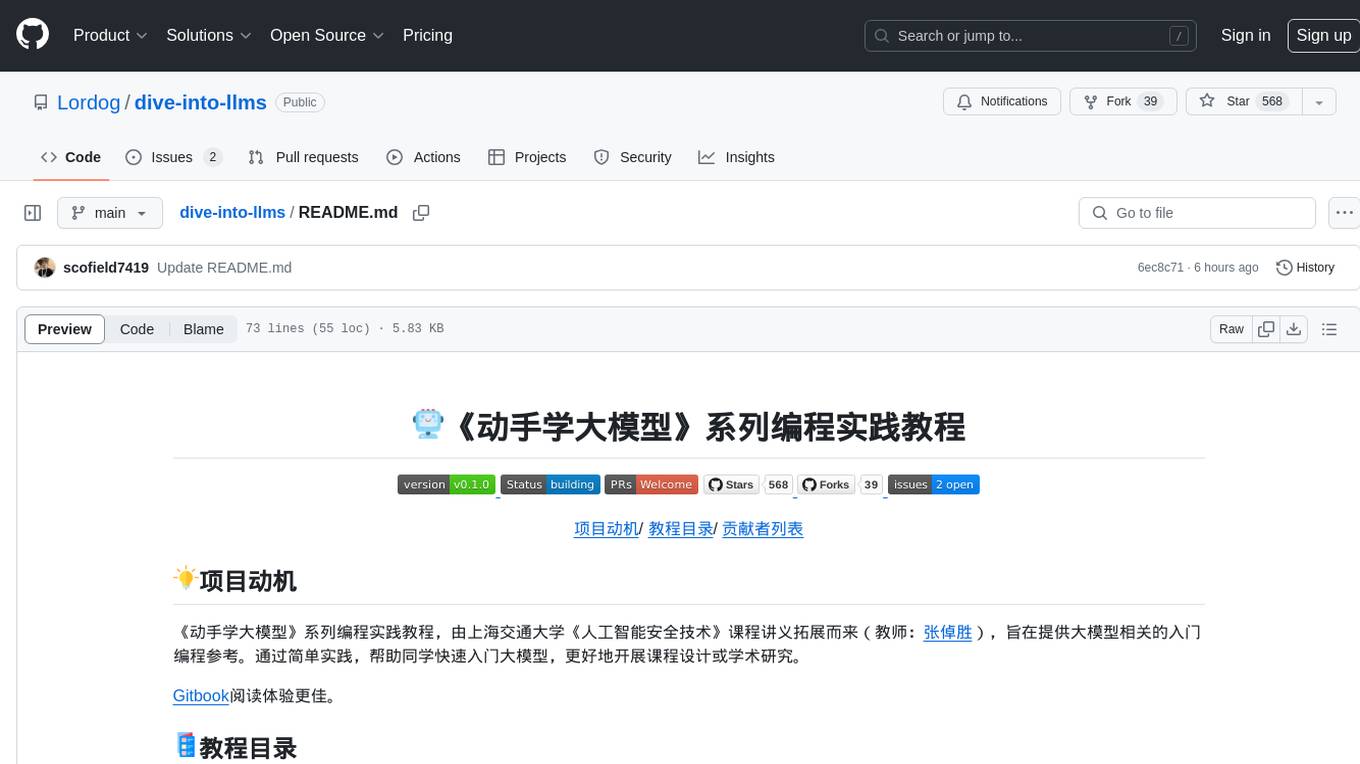
dive-into-llms
The 'Dive into Large Language Models' series programming practice tutorial is an extension of the 'Artificial Intelligence Security Technology' course lecture notes from Shanghai Jiao Tong University (Instructor: Zhang Zhuosheng). It aims to provide introductory programming references related to large models. Through simple practice, it helps students quickly grasp large models, better engage in course design, or academic research. The tutorial covers topics such as fine-tuning and deployment, prompt learning and thought chains, knowledge editing, model watermarking, jailbreak attacks, multimodal models, large model intelligent agents, and security. Disclaimer: The content is based on contributors' personal experiences, internet data, and accumulated research work, provided for reference only.
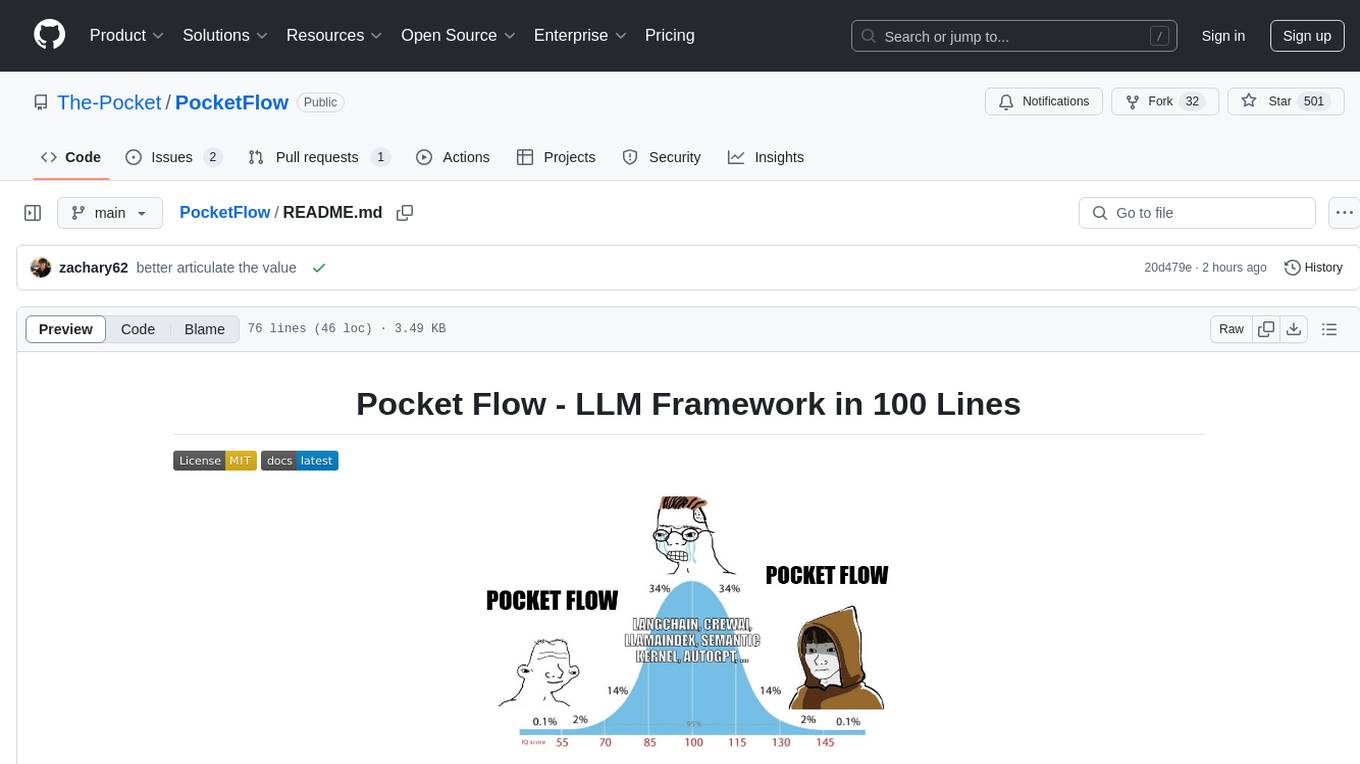
PocketFlow
Pocket Flow is a 100-line minimalist LLM framework designed for (Multi-)Agents, Workflow, RAG, etc. It provides a core abstraction for LLM projects by focusing on computation and communication through a graph structure and shared store. The framework aims to support the development of LLM Agents, such as Cursor AI, by offering a minimal and low-level approach that is well-suited for understanding and usage. Users can install Pocket Flow via pip or by copying the source code, and detailed documentation is available on the project website.
gpupixel
GPUPixel is a real-time, high-performance image and video filter library written in C++11 and based on OpenGL/ES. It incorporates a built-in beauty face filter that achieves commercial-grade beauty effects. The library is extremely easy to compile and integrate with a small size, supporting platforms including iOS, Android, Mac, Windows, and Linux. GPUPixel provides various filters like skin smoothing, whitening, face slimming, big eyes, lipstick, and blush. It supports input formats like YUV420P, RGBA, JPEG, PNG, and output formats like RGBA and YUV420P. The library's performance on devices like iPhone and Android is optimized, with low CPU usage and fast processing times. GPUPixel's lib size is compact, making it suitable for mobile and desktop applications.
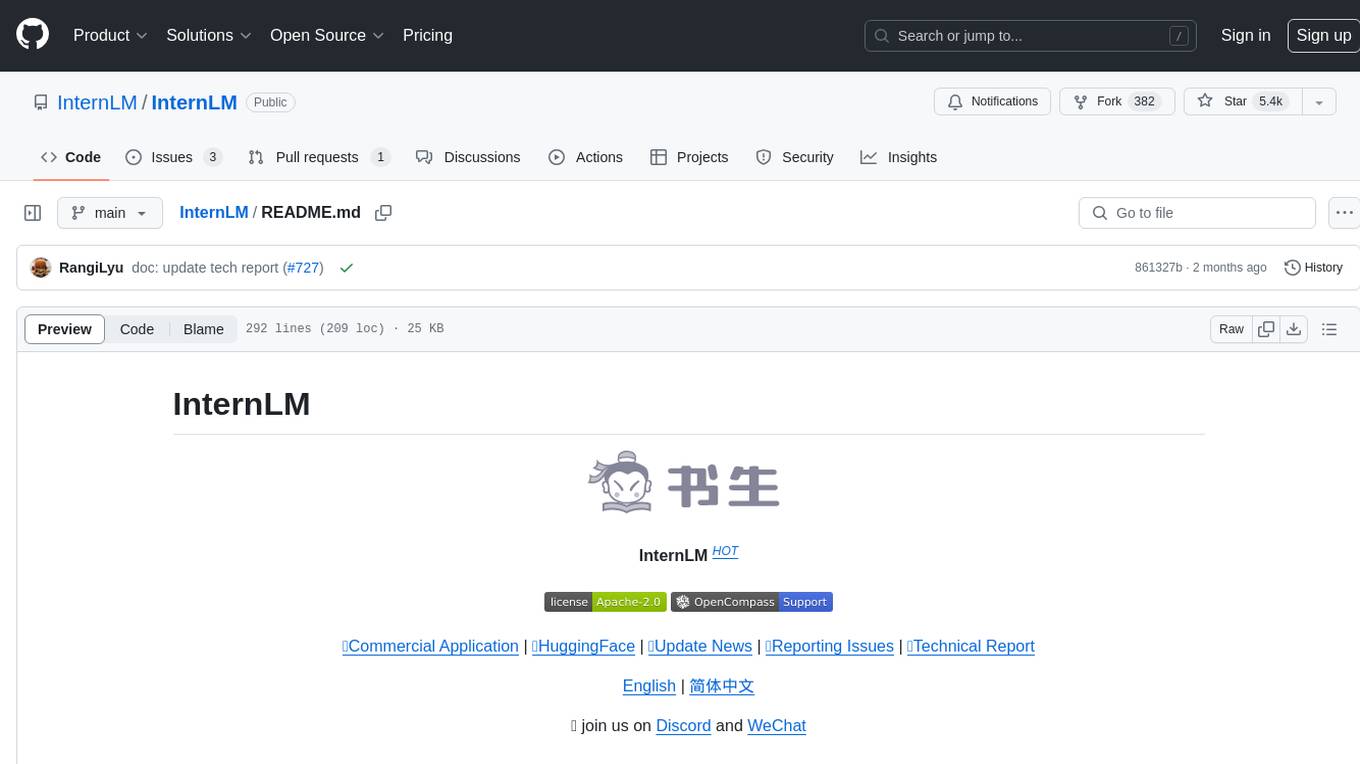
InternLM
InternLM is a powerful language model series with features such as 200K context window for long-context tasks, outstanding comprehensive performance in reasoning, math, code, chat experience, instruction following, and creative writing, code interpreter & data analysis capabilities, and stronger tool utilization capabilities. It offers models in sizes of 7B and 20B, suitable for research and complex scenarios. The models are recommended for various applications and exhibit better performance than previous generations. InternLM models may match or surpass other open-source models like ChatGPT. The tool has been evaluated on various datasets and has shown superior performance in multiple tasks. It requires Python >= 3.8, PyTorch >= 1.12.0, and Transformers >= 4.34 for usage. InternLM can be used for tasks like chat, agent applications, fine-tuning, deployment, and long-context inference.
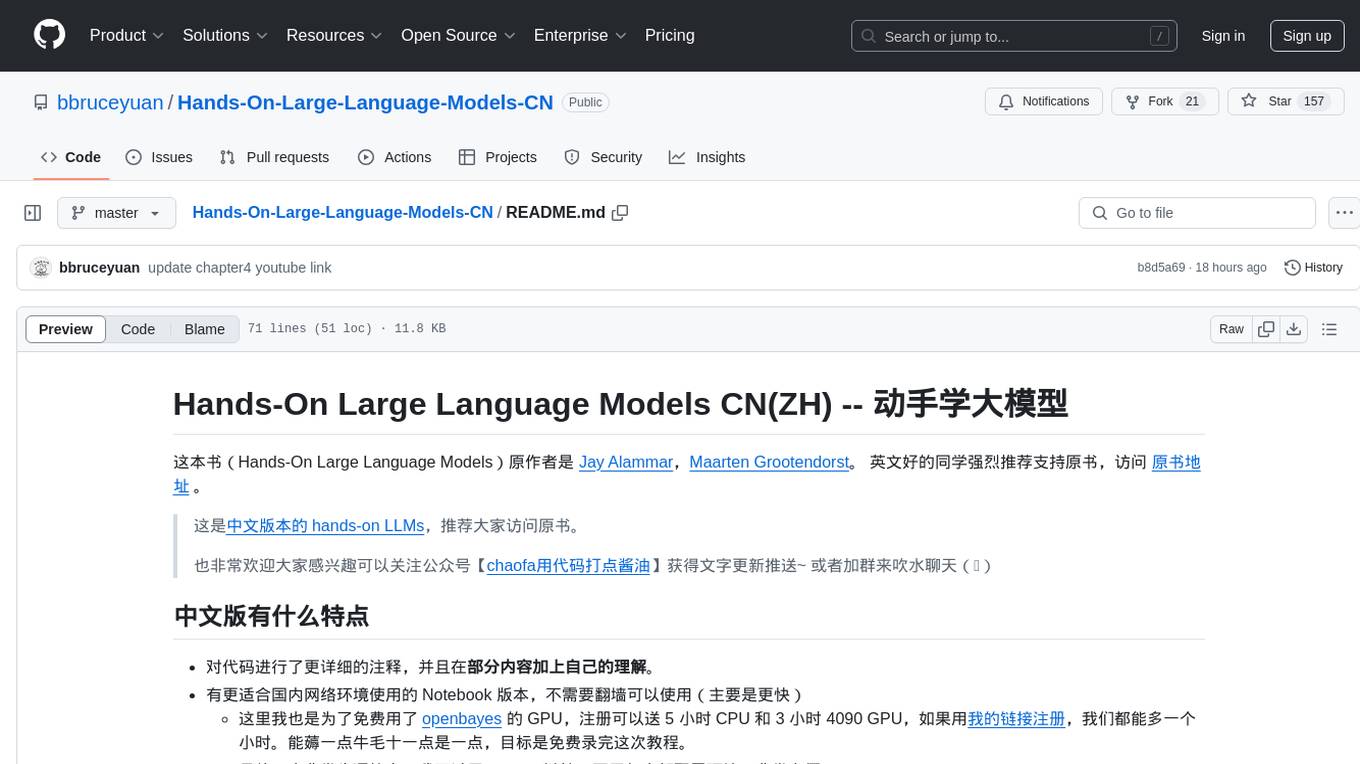
Hands-On-Large-Language-Models-CN
Hands-On Large Language Models CN(ZH) is a Chinese version of the book 'Hands-On Large Language Models' by Jay Alammar and Maarten Grootendorst. It provides detailed code annotations and additional insights, offers Notebook versions suitable for Chinese network environments, utilizes openbayes for free GPU access, allows convenient environment setup with vscode, and includes accompanying Chinese language videos on platforms like Bilibili and YouTube. The book covers various chapters on topics like Tokens and Embeddings, Transformer LLMs, Text Classification, Text Clustering, Prompt Engineering, Text Generation, Semantic Search, Multimodal LLMs, Text Embedding Models, Fine-tuning Models, and more.
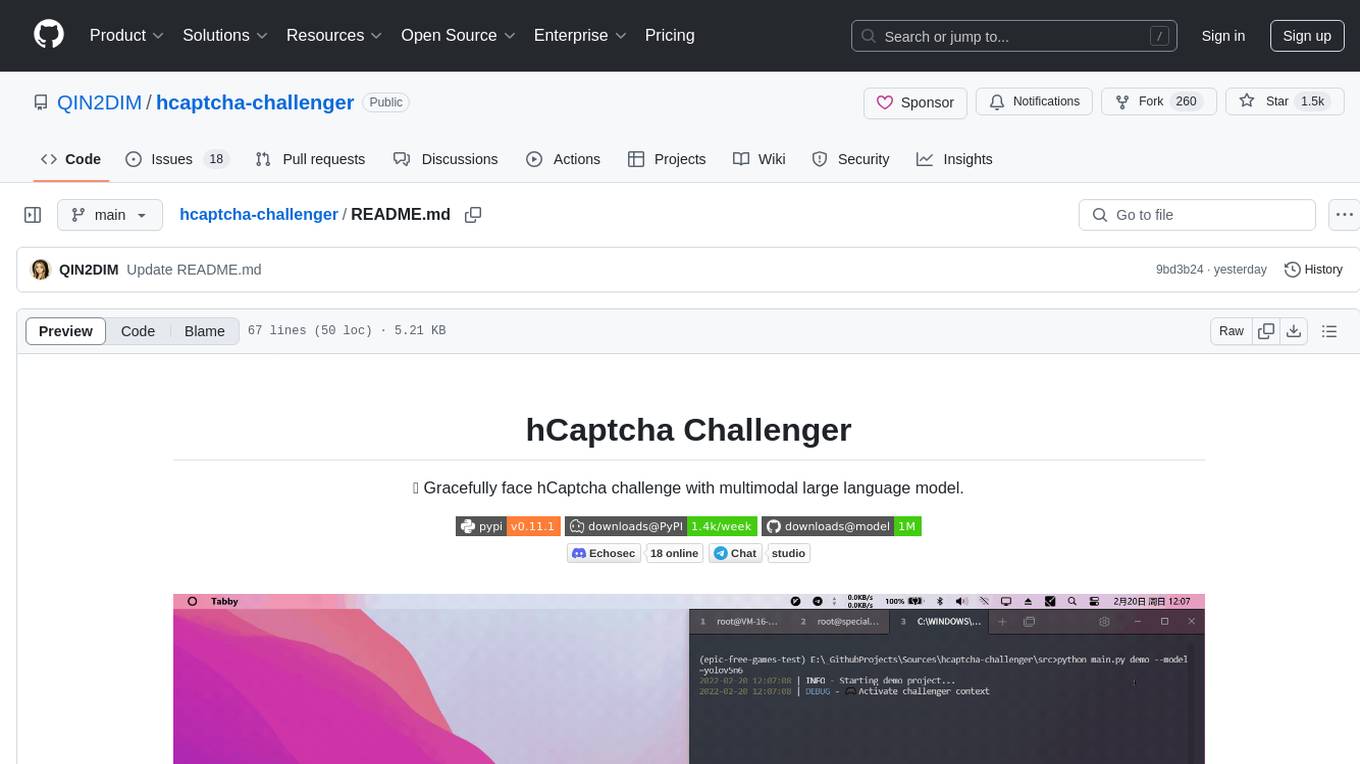
hcaptcha-challenger
hCaptcha Challenger is a tool designed to gracefully face hCaptcha challenges using a multimodal large language model. It does not rely on Tampermonkey scripts or third-party anti-captcha services, instead implementing interfaces for 'AI vs AI' scenarios. The tool supports various challenge types such as image labeling, drag and drop, and advanced tasks like self-supervised challenges and Agentic Workflow. Users can access documentation in multiple languages and leverage resources for tasks like model training, dataset annotation, and model upgrading. The tool aims to enhance user experience in handling hCaptcha challenges with innovative AI capabilities.
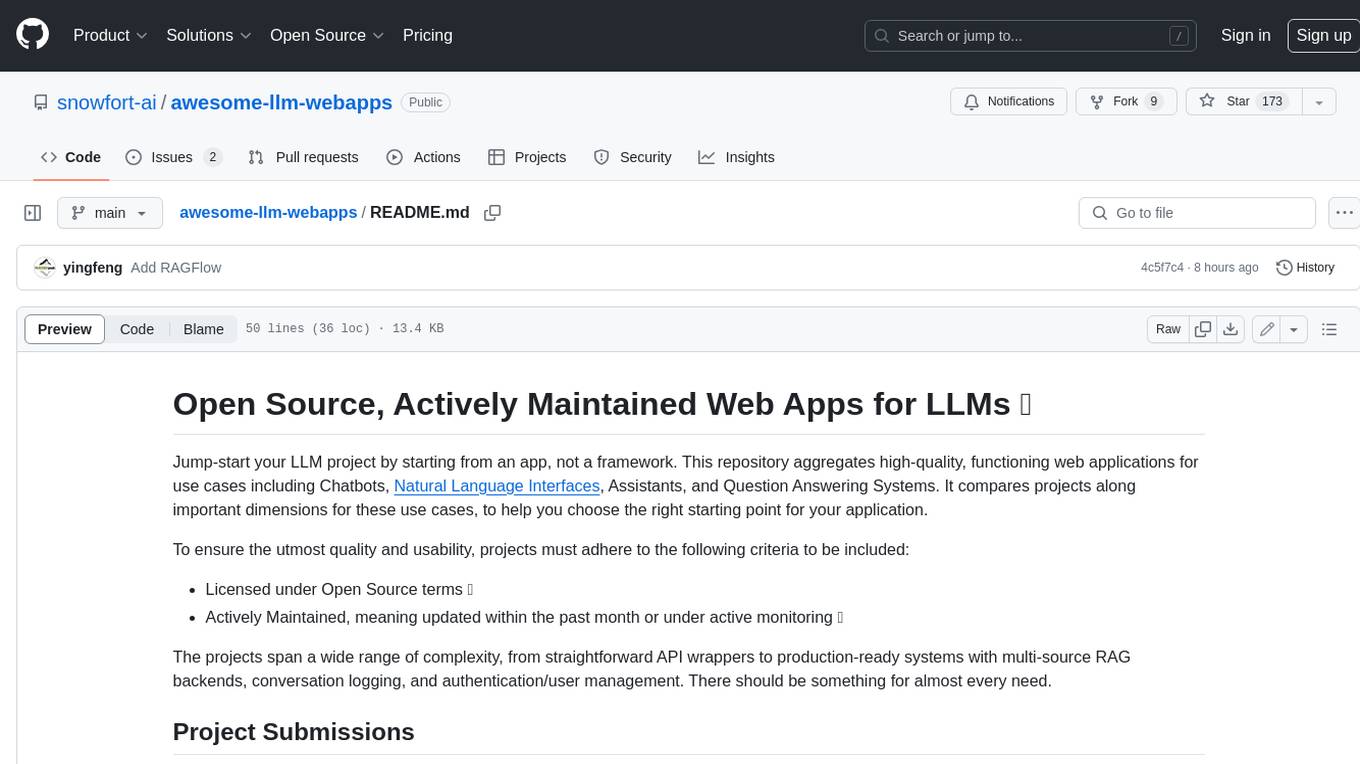
awesome-llm-webapps
This repository is a curated list of open-source, actively maintained web applications that leverage large language models (LLMs) for various use cases, including chatbots, natural language interfaces, assistants, and question answering systems. The projects are evaluated based on key criteria such as licensing, maintenance status, complexity, and features, to help users select the most suitable starting point for their LLM-based applications. The repository welcomes contributions and encourages users to submit projects that meet the criteria or suggest improvements to the existing list.
For similar tasks

langfuse
Langfuse is a powerful tool that helps you develop, monitor, and test your LLM applications. With Langfuse, you can: * **Develop:** Instrument your app and start ingesting traces to Langfuse, inspect and debug complex logs, and manage, version, and deploy prompts from within Langfuse. * **Monitor:** Track metrics (cost, latency, quality) and gain insights from dashboards & data exports, collect and calculate scores for your LLM completions, run model-based evaluations, collect user feedback, and manually score observations in Langfuse. * **Test:** Track and test app behaviour before deploying a new version, test expected in and output pairs and benchmark performance before deploying, and track versions and releases in your application. Langfuse is easy to get started with and offers a generous free tier. You can sign up for Langfuse Cloud or deploy Langfuse locally or on your own infrastructure. Langfuse also offers a variety of integrations to make it easy to connect to your LLM applications.

genai-os
Kuwa GenAI OS is an open, free, secure, and privacy-focused Generative-AI Operating System. It provides a multi-lingual turnkey solution for GenAI development and deployment on Linux and Windows. Users can enjoy features such as concurrent multi-chat, quoting, full prompt-list import/export/share, and flexible orchestration of prompts, RAGs, bots, models, and hardware/GPUs. The system supports various environments from virtual hosts to cloud, and it is open source, allowing developers to contribute and customize according to their needs.
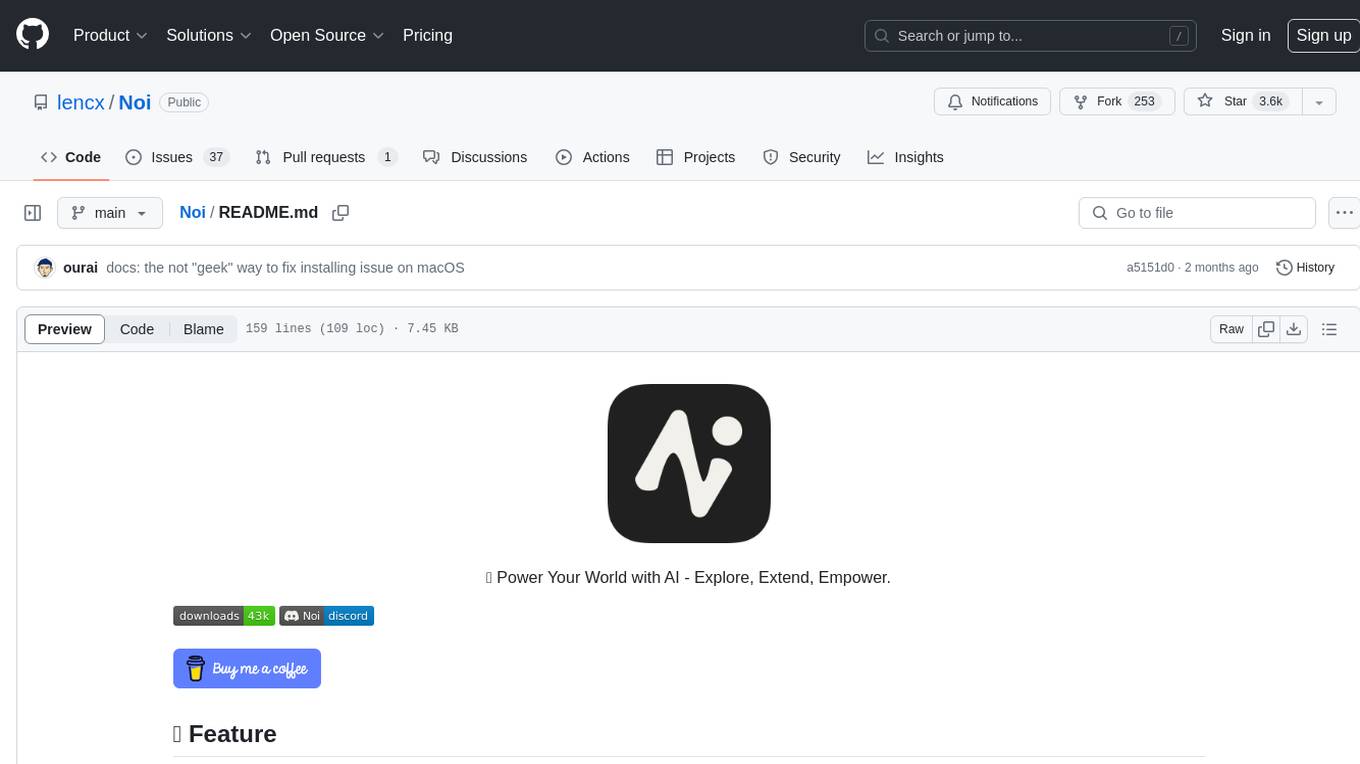
Noi
Noi is an AI-enhanced customizable browser designed to streamline digital experiences. It includes curated AI websites, allows adding any URL, offers prompts management, Noi Ask for batch messaging, various themes, Noi Cache Mode for quick link access, cookie data isolation, and more. Users can explore, extend, and empower their browsing experience with Noi.
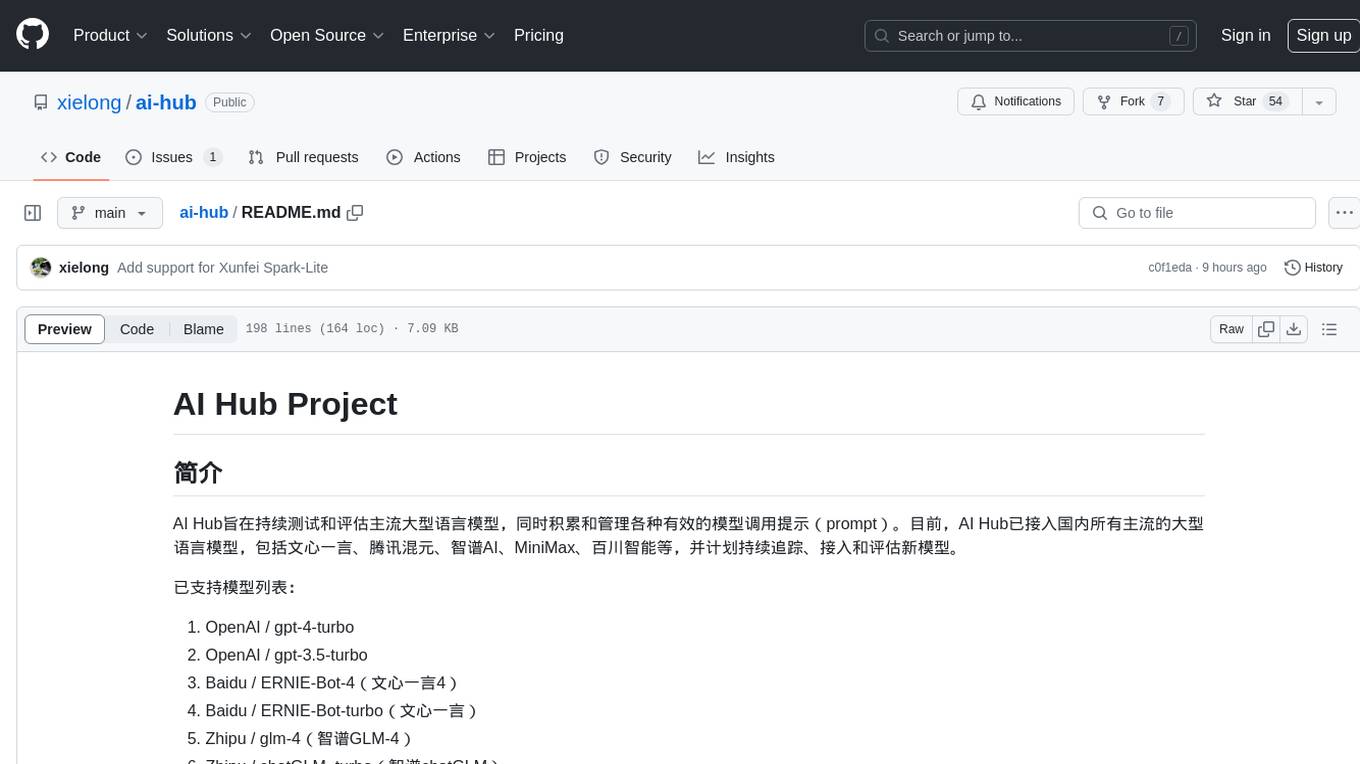
ai-hub
AI Hub Project aims to continuously test and evaluate mainstream large language models, while accumulating and managing various effective model invocation prompts. It has integrated all mainstream large language models in China, including OpenAI GPT-4 Turbo, Baidu ERNIE-Bot-4, Tencent ChatPro, MiniMax abab5.5-chat, and more. The project plans to continuously track, integrate, and evaluate new models. Users can access the models through REST services or Java code integration. The project also provides a testing suite for translation, coding, and benchmark testing.
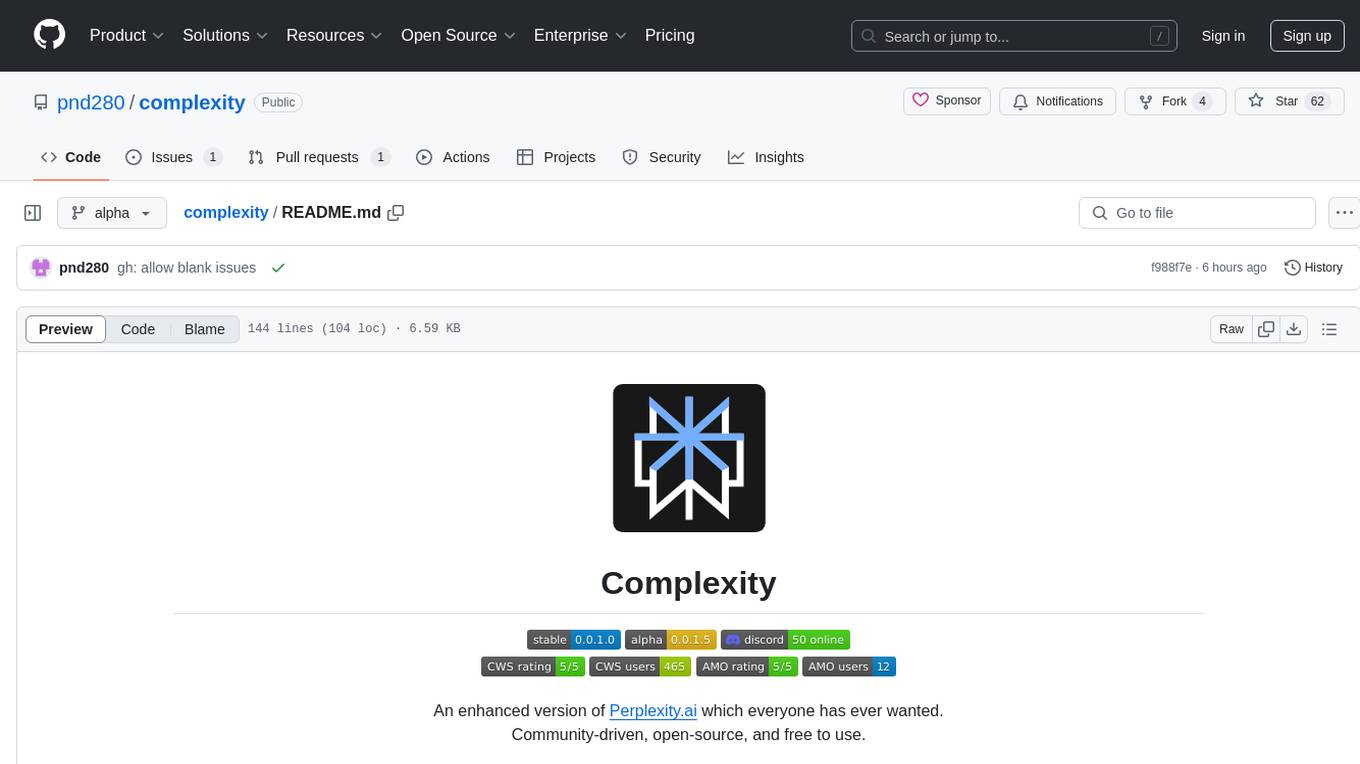
complexity
Complexity is a community-driven, open-source, and free third-party extension that enhances the features of Perplexity.ai. It provides various UI/UX/QoL tweaks, LLM/Image gen model selectors, a customizable theme, and a prompts library. The tool intercepts network traffic to alter the behavior of the host page, offering a solution to the limitations of Perplexity.ai. Users can install Complexity from Chrome Web Store, Mozilla Add-on, or build it from the source code.
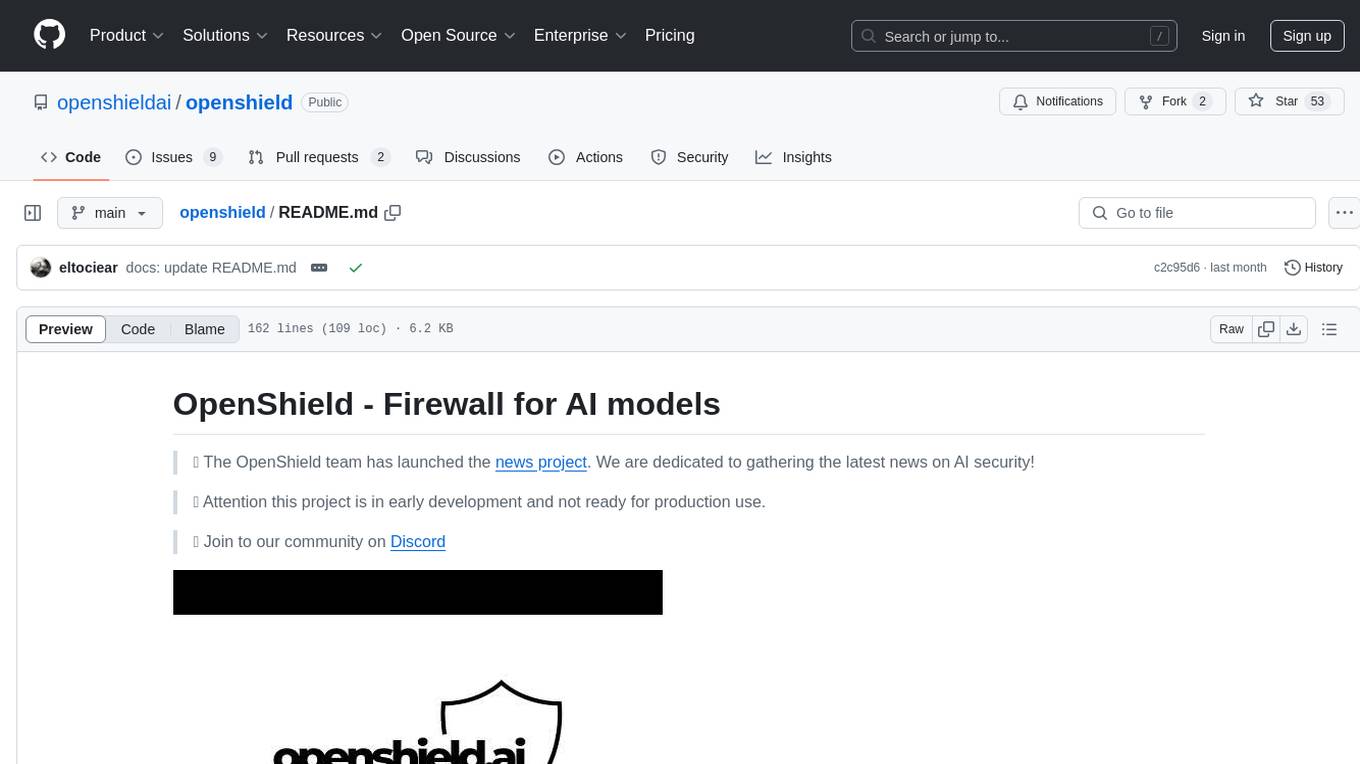
openshield
OpenShield is a firewall designed for AI models to protect against various attacks such as prompt injection, insecure output handling, training data poisoning, model denial of service, supply chain vulnerabilities, sensitive information disclosure, insecure plugin design, excessive agency granting, overreliance, and model theft. It provides rate limiting, content filtering, and keyword filtering for AI models. The tool acts as a transparent proxy between AI models and clients, allowing users to set custom rate limits for OpenAI endpoints and perform tokenizer calculations for OpenAI models. OpenShield also supports Python and LLM based rules, with upcoming features including rate limiting per user and model, prompts manager, content filtering, keyword filtering based on LLM/Vector models, OpenMeter integration, and VectorDB integration. The tool requires an OpenAI API key, Postgres, and Redis for operation.
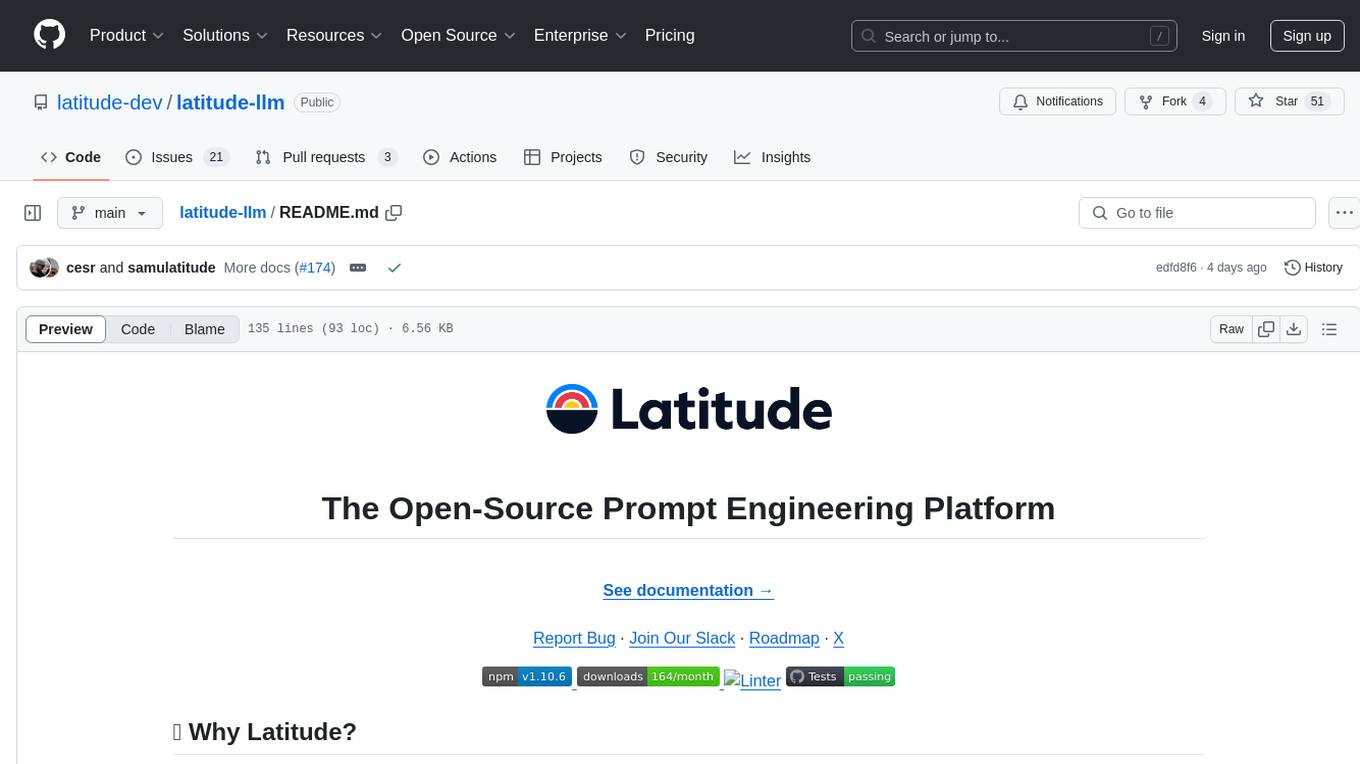
latitude-llm
Latitude is an open-source prompt engineering platform that helps developers and product teams build AI features with confidence. It simplifies prompt management, aids in testing AI responses, and provides detailed analytics on request performance. Latitude offers collaborative prompt management, support for advanced features, version control, API and SDKs for integration, observability, evaluations in batch or real-time, and is community-driven. It can be deployed on Latitude Cloud for a managed solution or self-hosted for control and customization.

Prompt-Engineering-Holy-Grail
The Prompt Engineering Holy Grail repository is a curated resource for prompt engineering enthusiasts, providing essential resources, tools, templates, and best practices to support learning and working in prompt engineering. It covers a wide range of topics related to prompt engineering, from beginner fundamentals to advanced techniques, and includes sections on learning resources, online courses, books, prompt generation tools, prompt management platforms, prompt testing and experimentation, prompt crafting libraries, prompt libraries and datasets, prompt engineering communities, freelance and job opportunities, contributing guidelines, code of conduct, support for the project, and contact information.
For similar jobs

weave
Weave is a toolkit for developing Generative AI applications, built by Weights & Biases. With Weave, you can log and debug language model inputs, outputs, and traces; build rigorous, apples-to-apples evaluations for language model use cases; and organize all the information generated across the LLM workflow, from experimentation to evaluations to production. Weave aims to bring rigor, best-practices, and composability to the inherently experimental process of developing Generative AI software, without introducing cognitive overhead.

agentcloud
AgentCloud is an open-source platform that enables companies to build and deploy private LLM chat apps, empowering teams to securely interact with their data. It comprises three main components: Agent Backend, Webapp, and Vector Proxy. To run this project locally, clone the repository, install Docker, and start the services. The project is licensed under the GNU Affero General Public License, version 3 only. Contributions and feedback are welcome from the community.

oss-fuzz-gen
This framework generates fuzz targets for real-world `C`/`C++` projects with various Large Language Models (LLM) and benchmarks them via the `OSS-Fuzz` platform. It manages to successfully leverage LLMs to generate valid fuzz targets (which generate non-zero coverage increase) for 160 C/C++ projects. The maximum line coverage increase is 29% from the existing human-written targets.

LLMStack
LLMStack is a no-code platform for building generative AI agents, workflows, and chatbots. It allows users to connect their own data, internal tools, and GPT-powered models without any coding experience. LLMStack can be deployed to the cloud or on-premise and can be accessed via HTTP API or triggered from Slack or Discord.

VisionCraft
The VisionCraft API is a free API for using over 100 different AI models. From images to sound.

kaito
Kaito is an operator that automates the AI/ML inference model deployment in a Kubernetes cluster. It manages large model files using container images, avoids tuning deployment parameters to fit GPU hardware by providing preset configurations, auto-provisions GPU nodes based on model requirements, and hosts large model images in the public Microsoft Container Registry (MCR) if the license allows. Using Kaito, the workflow of onboarding large AI inference models in Kubernetes is largely simplified.

PyRIT
PyRIT is an open access automation framework designed to empower security professionals and ML engineers to red team foundation models and their applications. It automates AI Red Teaming tasks to allow operators to focus on more complicated and time-consuming tasks and can also identify security harms such as misuse (e.g., malware generation, jailbreaking), and privacy harms (e.g., identity theft). The goal is to allow researchers to have a baseline of how well their model and entire inference pipeline is doing against different harm categories and to be able to compare that baseline to future iterations of their model. This allows them to have empirical data on how well their model is doing today, and detect any degradation of performance based on future improvements.

Azure-Analytics-and-AI-Engagement
The Azure-Analytics-and-AI-Engagement repository provides packaged Industry Scenario DREAM Demos with ARM templates (Containing a demo web application, Power BI reports, Synapse resources, AML Notebooks etc.) that can be deployed in a customer’s subscription using the CAPE tool within a matter of few hours. Partners can also deploy DREAM Demos in their own subscriptions using DPoC.















